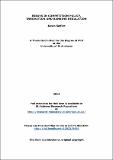Files in this item
Essays in competition policy, innovation and banking regulation
Item metadata
| dc.contributor.advisor | Ulph, David Tregear | |
| dc.contributor.author | Seifert, Jacob | |
| dc.coverage.spatial | 115 p. | en_US |
| dc.date.accessioned | 2016-09-08T10:00:56Z | |
| dc.date.available | 2016-09-08T10:00:56Z | |
| dc.date.issued | 2014 | |
| dc.identifier.uri | https://hdl.handle.net/10023/9456 | |
| dc.description.abstract | This thesis investigates the optimal enforcement of competition policy in innovative industries and in the banking sector. Chapter 2 analyses the welfare impact of compulsory licensing in the context of unilateral refusals to license intellectual property. When the risk-free rate is low, compulsory licensing is shown unambiguously to increase consumer surplus. Compulsory licensing has an ambiguous effect on total welfare, but is more likely to increase total welfare in industries that are naturally less competitive. Compulsory licensing is also shown to be an effective policy to protect competition per se. The chapter also demonstrates the robustness of these results to alternative settings of R&D competition. Chapter 3 develops a much more general framework for the study of optimal competition policy enforcement in innovative industries. A major contribution of this chapter is to separate carefully a firm's decision to innovate from its decision to take some generic anti-competitive action. This allows us to differentiate between firms' counterfactual behaviour, according to whether or not they would have innovated in the absence of any potentially anti-competitive conduct. In contrast to the existing literature, it is shown that the stringency of optimal policy will be harsher towards firms that have innovated in addition to taking a given anticompetitive action. Chapter 4 develops a framework for competition policy in the banking sector, which takes explicit account of capital regulation. In particular, conditions are derived under which increases in the capital requirement increase the incentives of banks to engage in a generic abuse of dominance in the loan market, and to exploit depositors through the sale of ancillary financial products. Thus the central contribution of this chapter is to clarify the conditions under which stability-focused capital regulation conflicts with competition and consumer protection policy in the banking sector. | en_US |
| dc.language.iso | en | en_US |
| dc.publisher | University of St Andrews | |
| dc.subject.lcc | HF1414.S4 | |
| dc.subject.lcsh | Competition | en_US |
| dc.subject.lcsh | Commercial policy | en_US |
| dc.subject.lcsh | Technological innovations--Economic aspects | en_US |
| dc.subject.lcsh | Banking law--Economic aspects | en_US |
| dc.title | Essays in competition policy, innovation and banking regulation | en_US |
| dc.type | Thesis | en_US |
| dc.contributor.sponsor | Economic and Social Research Council (ESRC). Grant number ES/J500136/1 | en_US |
| dc.type.qualificationlevel | Doctoral | en_US |
| dc.type.qualificationname | PhD Doctor of Philosophy | en_US |
| dc.publisher.institution | The University of St Andrews | en_US |
This item appears in the following Collection(s)
Items in the St Andrews Research Repository are protected by copyright, with all rights reserved, unless otherwise indicated.

